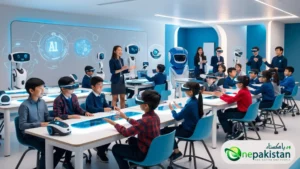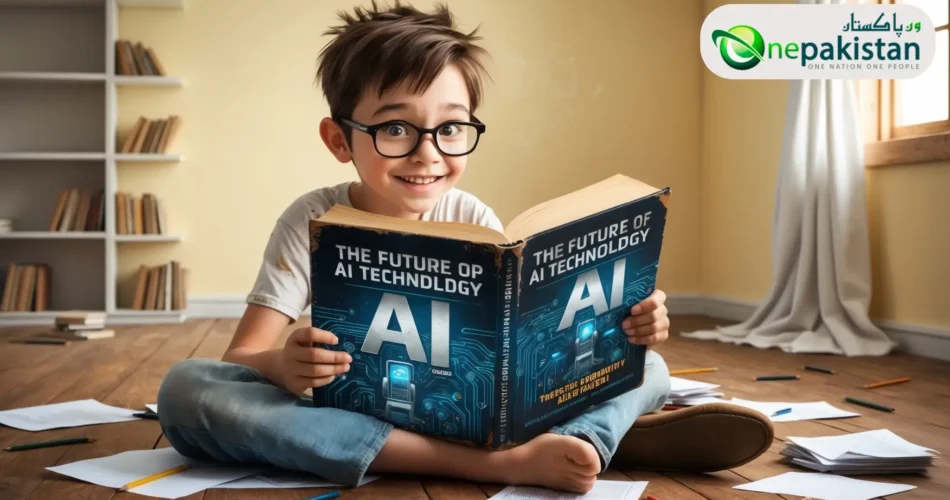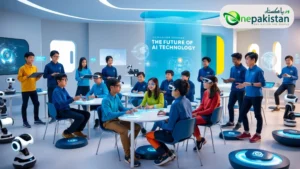AI is the latest buzz word for new wave innovation, and can be found everywhere, from how we work with machines to how businesses function. Recent rapid development of artificial intelligence (AI) has brought about new and unprecedented changes in many sectors including healthcare, finance, transportation and entertainment. Then what exactly is AI technology? What is it, and where is it going to go in the next twenty years?
In this article, we will learn the basics of AI, the use of current technology, what will be the future of the technology of AI and how AI has changed and will keep changing our society. If you’re a tech enthusiast, a business owner, or are just curious as to how AI might turn the world upside down, then how do you stay ahead on this technology?

What is AI Technology?
Understood as the suite of machine or software that mimic human cognitive functions such as learning, problem solving and decision making, AI technology is said to possess intelligence. In essence, AI makes the systems do the work, to process large quantities of data and make autonomous decisions, sometimes more quickly, sometimes more accurately than humans.
Algorithms underlie AI systems: They’re built to enable machines to ‘learn’ from experience. For example, machine learning (a kind of AI) makes AI systems better over time the way humans learn; say through training. AI systems ‘identify patterns’ and then use these to make predictions, optimize processes and automate complex tasks.
The broadness of AI technology encompasses several types, including:
- Narrow AI: Specializes in performing specific tasks, like voice assistants or recommendation systems.
- General AI: Theoretical AI that can perform any intellectual task that a human can do.
- Super intelligent AI: A form of AI that surpasses human intelligence in all aspects, from creativity to problem-solving.
AI technology uses various techniques such as neural networks, deep learning, and reinforcement learning to simulate the ways humans think and interact with their environment.
History of AI Technology
AI roots date back to ancient myths and legends, but its real practical development only started in the 1950s. Often considered the father of AI, Alan Turing came with the idea of the “Turing Test,” which involves placing a machine up against a human in order to measure whether or not the machine is intelligent, just like a human. John McCarthy coined the term ‘artificial intelligence’ in 1956 at a conference in Dartmouth, starting the study of its formal field as an entity separate from the vague study of general systems concepts.
Once the symbolist AI was proven not to work, the next wave of development was based on symbolic reasoning, but following the logic as far as it could before having to give up and either invent artificial intelligence computing revolution or accept the fact it was never going to work for artificial general intelligence. Nevertheless, such an approach was not adequate and was not able to capture the complexity of human intelligence. In the 1980s and 1990s focus was on developing machine learning algorithms that allowed the performance of the AI system to improve with time with no need to program. Today, we’re in the middle of an AI breakthrough with deep learning techniques mimicking the architecture of a human brain, transforming ways of doing business in every sphere.
Types of AI Technologies
There are three primary types of AI technologies:
Narrow AI (Weak AI):
Here we’ll say that narrow AI refers to AI systems that have been designed to accomplish specific tasks. They operate under restricted constraints and cannot do anything outside of programming. Examples include voice assistant (Siri, Alexa), image recognition software etc and self driving car navigation system.
General AI (Strong AI):
While still a theory, general AI is machines that can do every intellectual task that a human being could. Finally, it can understand, learn, and apply knowledge in different situations, and when comes to human cognition it more successfully copies the human brain. Many researchers have been developing general AI.
Super intelligent AI:
Super intelligent AI (often called Singularity, the AI Revolution, or The Machine) is the hypothetical future where AI becomes significantly more intelligent than humans, both in original creative acts as well as its artificial intelligence. However, it is a speculative idea, and experts expect it will go a long way toward transforming our society in dramatic ways.
AI Technology in Our Daily Lives
We are already using AI technology every day, and not even recognize it. That AI is everywhere, from voice assistants on smartphones to recommendations on Netflix and the results of a Google search, AI enhances the way we interact with the world. Here are some common examples of AI in daily life:
- Virtual Assistants: Siri, Google Assistant, and Alexa use AI to understand natural language, perform tasks, and provide information.
- Recommendation Systems: Platforms like Amazon, Netflix, and Spotify use AI to suggest products, movies, or music based on previous preferences.
- Smartphones: AI optimizes battery life, enhances camera performance, and even suggests responses in messaging apps.
- Social Media: AI algorithms curate your feed, determining which posts appear based on your behavior and preferences.
These everyday applications represent just the tip of the iceberg for how AI technology is transforming how we live, work, and interact.
The Role of Machine Learning in AI
Machine learning (ML) is a fraction of AI where the system learns and improves without explicit programing of it. Feeding large datasets into machine learning algorithms and over time, the system will become better at prediction and decision making.
For example, in self-driving cars, ML algorithms make use of sensor data to understand the environment, make decisions and continuously strive to take better driving patterns. AI technologies couldn’t exist without machine learning.
AI in Business and Industry
AI technology has a huge impact on businesses and this impact is just burgeoning. Today, when AI is applied to repetitive jobs, companies can automate them and save time and move faster on innovation. AI is used in the healthcare in diagnostics, treatment planning and drug discovery. AI is used in finance to help detect fraud, perform algorithmic trading and assess risk.
AI driven automation has also changed the way manufacturing processes are performed and reduced costs while increasing efficiency. In addition, customer service is gaining a boost from AI, with AI powers like chatbots offering real time support and raising customer satisfaction.
AI and Automation
In fact, AI and automation go hand in and together, since AI is pushing automation throughout the world. From manufacturing to logistics, AI systems are being deployed in such a way that these tasks are being replaced or supplemented by them with human labour.
In the very literal example of factories, robots packing assembly line capacity for shorter production times and fewer human errors have AI. Artificial intelligence (AI) robots use their power to manage inventory in logistics by optimizing the storage and retrieval processes. Similarly to that, AI driven systems in warehouses can automatically sort and package any kind of good.
Benefits of AI Technology
AI technology offers several benefits across various sectors, including:
- Efficiency: AI systems can perform tasks faster and more accurately than humans, leading to time and cost savings.
- Innovation: AI fosters innovation by enabling new products, services, and business models.
- Personalization: AI can deliver tailored experiences to users, improving customer satisfaction.
- Scalability: AI systems can be scaled to meet growing demands without significant increases in labor.
These advantages make AI an invaluable asset in nearly every industry, fueling growth and transformation worldwide.
Challenges and Concerns with AI Technology
Despite its potential, AI technology raises several concerns:
- Job Displacement: As AI automates more tasks, there are concerns about job losses, particularly in sectors like manufacturing and customer service.
- Bias and Fairness: AI systems are trained on data that may reflect human biases, leading to unfair or discriminatory outcomes.
- Privacy: AI systems often require vast amounts of data, raising concerns about the security and privacy of personal information.
Addressing these challenges will be critical in ensuring that AI technology benefits society as a whole.

Future of AI Technology
In terms of future of AI technology, it looks incredibly promising as we advance in natural language processing, quantum computing and AI for robotics. AI can be expected to increasingly play a central role in sectors of healthcare, education, transportation, and entertainment. But such a rapid growth would require careful consideration of such ethical, legal and social implications.
AI technology is only going to continue to evolve, and along the way, we will definitely see some breakthroughs in science and economics, and maybe even the next big step in space mining. AI has great potential to solve complex global challenges like growing shortages of resources and climate change.
FAQs
- What is AI technology?
AI technology refers to machines or systems that perform tasks requiring human intelligence, such as learning, problem-solving, and decision-making. - How does AI work?
AI works by processing large datasets and using algorithms to make decisions, improve over time, and perform tasks autonomously. - What is machine learning in AI?
Machine learning is a subset of AI that allows systems to learn from data, improve their performance, and make predictions without explicit programming. - What are the types of AI?
The three main types of AI are Narrow AI, General AI, and Super intelligent AI. - What are the benefits of AI technology?
AI offers benefits such as increased efficiency, innovation, personalization, and scalability across various industries. - How is AI used in healthcare?
AI is used in healthcare for diagnostics, treatment planning, drug discovery, and patient care, enhancing the accuracy and speed of medical processes.
Conclusion
Every facet of our life is being reshaped by AI technology. Possibly revolutionizing industries, or us just living a little better. For us, as we march towards the future, fast development of technology will continue in the path of AI, however, and we have to do so responsibly and with high thoughtfulness.





